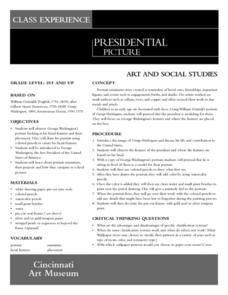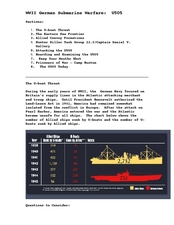Curated OER
The Abiotic Limits to Purple Loosestrife Growth
Learners investigate the effects of soil temperature, water availability, photo period and other variables of the growth of purple loosestrife. They observe the growing conditions of plants and alter them by adding water, isolating the...
Curated OER
The Cinder-Eyed Cats - Storybook Theater
The students listen to the story "The Cinder-Eyed Cats." The students then chose individual parts to play in a theater like production. The students move like their character, be it a fish, an octopus, a lobster, a cat, etc. Water music...
Curated OER
ALARA
This activity sheet posts a chart of the common radiation sources in our everyday lives. Chemistry scholars use it to analyze their own radiation exposure using rem (Roentgen equivalent for man) units. This simple assignment increases...
Curated OER
Presidential Picture
Students create miniature portraits of George Washington using a primary source image, watercolor pencils, colored pencils and white drawing paper. This Art lesson can be used as an introductory lesson on George Washington in a U.S....
Curated OER
9th Grade
Ninth graders discuss the principal source of energy entering the marine ecosystem. They name some of the autotrophs at the Maui Ocean Center. Students name some of the heterotrophs at Maui Ocean Center. They are taught that plants are...
Curated OER
Explorit's "KIDS" Quiz 2
Visit the Explorit Science Center for a quick, interactive quiz. There are five questions on this online quiz, and while they're all related to science, none of them are related to each other. For example, one question asks how many...
Curated OER
Tide Types
Students record hourly reading for water height for 24 hours and determine whether a location experiences diurnal, semi-diurnal or mixed tides. Links are present for the information. Students predict high and low tide, and answer a set...
Curated OER
Renewable vs. Non-Renewable Resources
Here's a fine lesson on renewable and non-renewable sources of energy for your 5th graders. In it, learners list a number of natural resources on the board, then try to sort the resources into appropriate categories. This helps them to...
Curated OER
Class Presentation on Coal
Did you know that coal was formed from plants? After being assigned a coal-related topic, groups gather, organize, and present information about this energy source. The presentations should include visuals like graphs, charts, tables,...
Foreign Policy Research Institute
A Geography Lesson
Fewer and fewer people have a strong grasp of world geography, but this activity helps students understand geopolitics by creating their own original historical map. The activity requires selecting a country from the list provided,...
Curated OER
ESL Picture/Idiom Matching Worksheet
In this ESL picture to idiom matching worksheet, students examine 7 small clip art images before matching them to the idioms they best represent. They work with idioms such as "blood is thicker than water," and "as you make your bed, so...
Curated OER
WWII German Submarine Warfare: U505
Students research how the capture of a German submarine by the Allies affected the outcome of WWII. In this WWII lesson, students complete a KWL chart. Students research primary source documents online and answer discussion questions.
Curated OER
Make a Windmill
Students explore Earth science by conducting an energy experiment in class. In this windmill lesson, students identify how wind has been used to pump water throughout history and the latest developments wind energy has produced. Students...
Curated OER
All Hands on Deck: A Harbor Education Program
Pupils build a model of an estuary. In this wetland instructional activity, students build a model estuary with a paint tray and modeling clay. They use the model to illustrate the impact of non-point pollution on the watershed.
Curated OER
Know Your Watershed
Students investigate the importance and the location of their own watershed by visiting and EPA website and also work in groups to create an action plan on how to protect their local watershed.
Curated OER
Ocean Planet: Pollution Solution
Pupils explore the concept of environmental stewardship. In this science instructional activity, students investigate the impact of oil spills as they discuss historical spills. Pupils use problem solving skills to brainstorm clean-up...
Curated OER
Preparing for Drought
Learners study droughts in Oklahoma and list possible reasons for droughts. They form subcommittees to explore the drought problem and create plans for drought management and relief. They research five areas around the world where...
Curated OER
Amoeba This!!! Amoeba That!!!
Students investigate protozoa. In this protozoa lesson, students identify and classify different types of protozoa using different ecological samples and protozoa charts.
Curated OER
The Biosphere
In this biosphere worksheet, students identify the different levels of organization that ecologists study. Students complete charts, sentences, and answer short answer questions.
Curated OER
Observation Journal
In this ocean life learning exercise, students observe the plants, animals, human activity, park rules/local laws, at a specific location. Students also observe any activity in neighborhoods, the water sources for the area, the water...
Curated OER
Environment: Methane Sources
Students discover how human activity is increasing the release of methane gas into the atmosphere. Woring in groups, they visit the Eduzone Website and complete worksheets. Students identify the natural and human causes of methane gas.
Curated OER
Pea Soup Ponds
Young scholars perform an experiment where they learn how water can be polluted by algal bloom. They grow algae with different concentrations of fertilizers or nutrients and analyze their results.
Curated OER
Building a Model Springbox
Learners examine ways to protect fresh drinking water. In this clean drinking water lesson, students listen to the story of Lauren Fry about building a springbox to collect groundwater. Learners build a springbox.
Curated OER
Heat Loss and Cool Gains
Fifth graders predict what happens when cold and hot water are mixed together. In this physics lesson, 5th graders discuss how heat transfer takes place. They record temperature readings and compare it with their prediction.
Other popular searches
- Sources of Water Pollution
- Water Sources Grades K 2
- Water Sources K 2
- Activities on Water Sources
- Natural Water Sources
- Water Sources in Qatar
- Types of Water Sources
- Landforms Water Sources
- Sources of Water
- Streams as Water Sources
- Natural Sources of Water
- Water Sources in Drought

























